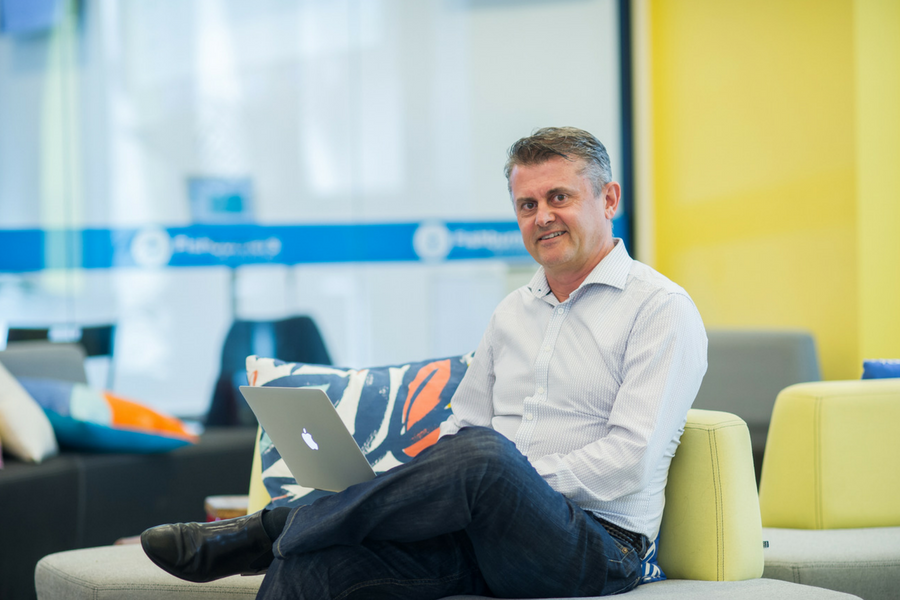Brisbane startup Movus today welcomed Queensland Minister for Innovation, Kate Jones to officially open its new office, but the startup was defined by what it didn’t have rather than what it did when its journey began in January 2015.
“We started with a concept, went in to see a business with a PowerPoint, and sold the PowerPoint,” explained cofounder and CEO Brad Parsons.
“Then we had to build the product.”
The product, now being used by customers from regional Australia to the US and even New Caledonia, is most easily explained, Parsons said, as “a FitBit for machines”.
The system works by mounting a FitMachine sensor to an asset, with the sensor then collecting and sending data to the cloud. The software’s algorithms work to establish a baseline for the condition of the equipment, and continually monitor and analyse the data to predict the health of the asset.
With alerts sent if the asset’s condition goes below pre-determined limits, the system aims to help customers proactively manage their asset, in turn reducing the need for customers to conduct manual inspections and minimising the risk of unplanned downtime.
Parsons came up with the idea after years working in heavy asset industries with the likes of BHP and Sydney Trains, working on automation strategies and condition monitoring.
With 2.3 billion machines on the planet and just three percent of them being monitored, there are significant efficiencies to be found – and a huge market to be tapped.
The first customer Parsons and cofounder Michel Lamarre brought on with the PowerPoint was a water authority, highlighting the fact organisations big and small across various industries are facing the same problems when it comes to managing their machinery.
“They’re all fighting fires, all trying to get ahead of the curve and keep their customers happy,” Parsons said.
“We could also see their pain of having a lot of their experienced engineers in their 50s and 60s transitioning out of the workforce and all the younger men and women coming through expecting more advanced tools. Technology really hasn’t changed for decades.”
In looking to change this, and make a product out of its PowerPoint, the startup went into the iLab program at the University of Queensland; while the decision to join the program was made in order to associate Movus with a reputable institution and give it access to research and development resources, it also served as Parsons’ introduction to the startup world.
“I had zero [awareness] of it, to be honest…a startup was just something from Silicon Valley, not something that was really happening on our doorstep in 2015. It was still pretty early,” Parsons explained.
This too meant it was slow going for the startup growing its team, with the problem twofold: Brisbane just isn’t a huge market for talent, Parsons explained, and when he did talk to those with the right skills, it could be hard to convince them to leave their secure corporate job to join a startup.
“It’s a hard thing to sell. You’re selling vision and you’re selling the future, but they’ve got mouths to feed,” Parsons admitted.
Now at 16 full time employees and 13 interns, the cofounder is now convinced that the company has found “the absolute best of breed in this business”: the team has now developed the seventh generation of the FitMachine device, and as Parsons put it, is making mistakes faster and fixing them faster than ever before.
It has been helped along the way by government grants, receiving an Ignite Ideas grant from the first round of the Queensland Government program, and a Commercialisation Australia grant from the federal government.
Beyond the grant funding itself, Parsons said the Queensland Government in particular has been hands-on with its support, introducing the startup to new team members and prospective clients alike.
Parsons last year went to Israel on an agricultural mission funded by the state government, for example, where he gained exposure to Pepsi; the company recently approached Movus to explore the running of a pilot in the UK, with a view to then expanding it across Europe.
This growing interest led Movus to raise $4.8 million in a Series A funding from Blackbird Ventures, Skip Capital, and Telstra Ventures in April, with Parsons explaining the time had come when the business knew it has to raise if it wanted to scale.
“It was really getting to the point where we were getting pinched in a number of areas; we were hand manufacturing, with a team of five or six constantly building, building, building. We were then getting interest from overseas and from the likes of the oil and gas and miners, who want a product that’s not going to blow up an oil rig. To invest in that alone is a quarter of a million dollars,” Parsons explained.
“Taking it to the next level requires a different level of sophistication; Blackbird have invested in Canva and Scott Farquhar has built Atlassian into a multi-billion dollar business, and we needed those kinds of people on the team to help us manage that journey.”
As it progresses along that journey, the company is trying to find a balance between servicing both the small business and corporate markets.
With the likes of Wesfarmers Chemicals, Melbourne Water, and the University of Queensland on board as customers and Movus seeing interest everywhere from the Philippines to Germany, Parsons said a significant portion of its customers are SMBs in the food and manufacturing sectors across Australia.
“They’re the ones taking to us really quickly, because they understand the product; they’re the mum and dad businesses who can’t afford for this motor to go down or this pump to shut off, so that’s where we’re trying to focus our interest in Australia,” Parsons said.
Image: Brad Parsons. Source: Supplied.




















Trending
Daily startup news and insights, delivered to your inbox.